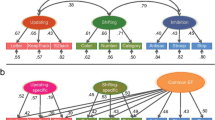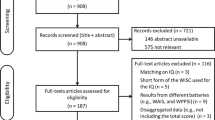Abstract
The complicated cognitive processes involved in natural (primary) bilingualism lead to significant cognitive development. Executive functions as a fundamental component of human cognition are deemed to be affected by language learning. To date, a large number of studies have investigated how natural (primary) bilingualism influences executive functions; however, the way acquired (secondary) bilingualism manipulates executive functions is poorly understood. To fill this gap, controlling for age, gender, IQ, and socio-economic status, the researchers compared 60 advanced learners of English as a foreign language (EFL) to 60 beginners on measures of executive functions involving Stroop, Wisconsin Card Sorting Task (WCST) and Wechsler’s digit span tasks. The results suggested that mastering English as a foreign language causes considerable enhancement in two components of executive functions, namely cognitive flexibility and working memory. However, no significant difference was observed in inhibitory control between the advanced EFL learners and beginners.
Similar content being viewed by others
References
Ahmadpour, Z. (2004). A study of the problems and issues in highschool English language teaching. Foreign Language Teaching Journal, 71 (In Persian).
Alder, M. K. (1977). Collective and individual bilingualism: A sociolinguistic study. Hamburg: Helmut Buske Verlag.
Atkins, P. W. B., & Baddeley, A. D. (1998). Working memory and distributed vocabulary learning. Applied Psycholinguistics, 19, 537–552.
Ben-Zeev, S. (1977). Mechanisms by which childhood bilingualism affects understanding of language and cognitive structures. In P. A. Hornby (Ed.), Bilingualism: Psychological, social, and educational implications. New York: Academic Press.
Bialystok, E. (2007). Cognitive effects of bilingualism: How linguistic experience leads to cognitive change. The International Journal of Bilingual Education and Bilingualism, 10(3), 210–223.
Bialystok, E., Craik, F. I. M., Binns, M. A., Ossher, L., & Freedman, M. (2014). Effects of bilingualism on the age of onset and progression of MCI and AD: Evidence from executive function tests. Neuropsychology, 28(2), 290–304.
Bialystok, E., Craik, F. I. M., Green, D. W., & Gollan, T. H. (2009). Bilingual minds. Psychological Science in the Public Interest, 10, 89–129.
Bialystok, E., Craik, F. I. M., Klein, R., & Viswanathan, M. (2004). Bilingualism, aging, and cognitive control: Evidence from the Simon task. Psychology and Aging, 19(2), 290–303.
Bialystok, E., Craik, F. I. M., & Luk, G. (2008). Cognitive control and lexical access in younger and older bilinguals. Journal of Experimental Psychology: Learning, Memory, and Cognition, 34(4), 859–873.
Bialystok, E., & Martin, M. M. (2004). Attention and inhibition in bilingual children: Evidence from the dimensional change card sort task. Developmental Science, 7(3), 325–339.
Bialystok, E., & Viswanthan, M. (2010). Components of executive control with advantages for bilingual children in two cultures. Cognition, 112(3), 494–500.
Brace, J. J., Morton, J. B., & Munakata, Y. (2006). When actions speak louder than words: Improving children’s flexibility in a card-sorting task. Psychological Science, 17(8), 665–669.
Daniel, K., Toth, J., & Jacoby, L. (2006). The aging of executive functions. In E. Bialystok & F. I. M. Craik (Eds.), Lifespan cognition: Mechanisms of change (pp. 96–111). New York, NY: Oxford University Press.
Davidson, D., Raschke, V. R., & Pervez, Z. (2010). Syntactic awareness in young monolingual and bilingual (Urdu-English) children. Cognitive Development, 25, 166–182.
Diamond, A., Barnett, W. S., Thomas, J., & Munro, S. (2007). Preschool program improves cognitive control. Science, 318, 1387–1388.
Hakuta, K., & Diaz, R. M. (1985). The relationship between bilingualism and cognitive ability: A critical discussion and some new longitudinal data. In K. E. Nelson (Ed.), Children’s language (Vol. 5, pp. 319–344). Hillsdale, NJ: Erlbaum.
Hilchey, M. D., & Klein, R. M. (2011). Are there bilingual advantages on nonlinguistic interference tasks? Implications for the plasticity of executive control processes. Psychonomic Bulletin & Review, 18, 625–658.
Hoffmann, C. (1991). An introduction to bilingualism. New York, NY: Longman Group Ltd.
Jamali, D. (2008). Students and their disability in speaking English, English language teaching. Roshd Magazine, 60 (in Persian).
Kapa, L. L., & Colombo, J. (2014). Executive function predicts artificial language learning. Journal of Memory and Language, 76, 237–252.
Krashen, S. D. (1982). Principles and practice in second language acquisition. Oxford: Pergamon Press.
Kuo, L.-J., & Anderson, R. C. (2012). Effects of early bilingualism on learning phonological regularities in a new language. Journal of Experimental Child Psychology, 111, 455–467.
Lezak, M. D. (1982). The problem of assessing executive functions. International Journal of Psychology, 17, 281–297.
Martensson, J., Eriksson, J., Bodammer, N. C., Lindgren, M., Johansson, M., Nyberg, L., et al. (2012). Growth of language-related brain areas after foreign language learning. NeuroImage, 63(1), 240–244.
Miyake, A., & Shah, P. (1999). Toward unified theories of working memory: Emerging general consensus, unresolved theoretical issues, and future research directions. In A. Miyake & P. Shah (Eds.), Models of working memory: Mechanisms of active maintenance and executive control (pp. 442–481). Cambridge: Cambridge University Press.
Najarian, B., & Barati Sedeh, F. (1993). Stroop test. Psychological. Research Quarterly, 3, 55–65. (in Persian).
Namazi, M., & Thordardottir, E. (2010). A working memory, not bilingual advantage, in controlled attention. International Journal of Bilingual Education and Bilingualism, 13(5), 597–616.
Peal, E., & Lambert, W. E. (1962). Relation of bilingualism to intelligence. Psychological Monographs, 76, 1–23.
Salthouse, T. A., Atkinson, T. M., & Berish, D. E. (2003). Executive functioning as a potential mediator of age-related cognitive decline in normal adults. Journal of Experimental Psychology: General, 132(4), 566–594.
Schlegel, A. A., Rudelson, J. J., & Tse, P. U. (2012). White matter structure changes as adults learn a second language. Journal of Cognitive Neuroscience, 24(8), 1664–1670.
Stroop, J. R. (1935). Studies in interference in serial verbal reactions. Journal of Experimental Psychology, 18, 643–661.
Wechsler, D. (1974). Wechsler intelligence scale for children–revised. New York, NY: Psychological Corporation.
Wölck, W. (1987). Types of natural bilingual behavior: A review and revision. Bilingual Review / La Revista Bilingüe, 14(3), 3–16.
Author information
Authors and Affiliations
Corresponding author
Ethics declarations
Conflict of interest
The authors declare that they have no conflict of interest.
Rights and permissions
About this article
Cite this article
Shoghi Javan, S., Ghonsooly, B. Learning a Foreign Language: A New Path to Enhancement of Cognitive Functions. J Psycholinguist Res 47, 125–138 (2018). https://doi.org/10.1007/s10936-017-9518-7
Published:
Issue Date:
DOI: https://doi.org/10.1007/s10936-017-9518-7




